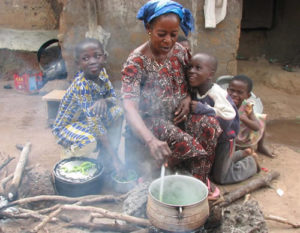Biomass fuel identified to be threat to pregnancy outcomes and infant health
 Over a thousand pregnant women and their infants who have been followed in a project for a number of years by the Kintampo Health Research Centre (KHRC) in the area have been found to have complications with their health as a result of their use of biomass fuel in cooking.
Over a thousand pregnant women and their infants who have been followed in a project for a number of years by the Kintampo Health Research Centre (KHRC) in the area have been found to have complications with their health as a result of their use of biomass fuel in cooking.
Some of the findings of this environmental studies are that women have heart problems associated with their systolic and diastolic heart pressures, while the infants belonging to these women developed problems associated with pneumonia, low birth weight and lung functions among others.
Alhaji Sulemana Watara Abubakari, Head of Environmental Department of the KHRC, who was interacting with a team of journalists on a field trip to the KHRC in the Bono East region, said the study is finding out a way to help in the adoption of a clean way of cooking to avoid household pollution.
He explained that it’s an on-going study to get people to use cleaner methods of cooking.
According to him, they are building data sets and after some time there are plans to have a whole study that would follow an entire life course of people from childhood to the adult stage.
He said the policy on LPG adoption by poor communities involves many variables, such as costs and distance to the LPG stations, which is easier for urban communities than the rural.
He explained that the study with some support has created LPG stations in the study areas. He added that even then people still find it easy to get firewood to cook, especially in the rural areas.
Alhaji Abubakari said the study is implementing a smart study at Techiman, a peri-urban area, by giving subsidies and discriminating in favour of poor households.
He explained that government could target the poor for such interventions to encourage the use of LPG.
Speaking to the journalists on a different research activity carried out on COVID-19 vaccine hesitancy by the KHRC, Alhaji Abubakari said one of the findings of this study is that the adolescents in their study were more concerned with the safety and efficacy of the vaccines while the adults were worried about whether the vaccines would be available.
He said the study was carried out in Ghana, Burkina Faso, Ethiopia, Nigeria and Tanzania.
He explained that some of the findings from the vaccine hesitancy study showed it was fueled by misinformation and therefore it is important that communication around the vaccine is deliberate by providing facts.
The journalists are on a field trip to the KHRC to acquaint themselves with some of the projects of the centre. It was organized by the African Media and Malaria Research Network (AMMREN) in collaboration with the KHRC.
Eunice Menka
Copyright ©2022 by NewsBridge Africa
All rights reserved. This article or any portion thereof may not be reproduced or used in any manner whatsoever without the express written permission of the publisher except for the use of brief quotations in reviews.
